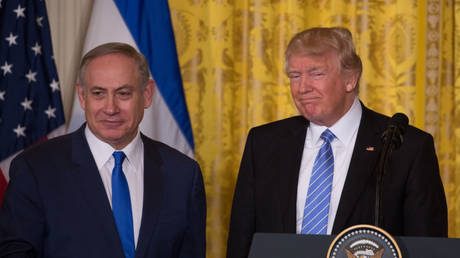Could Trump Lead to Increased Military Conflict in the Middle East?
The pragmatic approach of the US president-elect, along with their unwavering support for Israel, may lead to an increase in tensions.

This election cycle was particularly arduous, exposing profound divisions and a populace fatigued by conventional political dynamics. The stakes included not only domestic leadership but also a declining global influence that America has traditionally wielded.
Interest in the election extended well beyond US borders. Observers from both allies and adversaries, including political analysts and everyday citizens, closely monitored the developments. Although Washington’s global supremacy may be diminishing, its influence remains significant across various regions. The US plays a role in multiple conflicts – including those in Ukraine and Gaza. The outcome of this election was understood to have far-reaching implications for strategic decisions worldwide.
Internally, Trump’s policies during his initial term emerged as symbols of a movement to reinforce traditional American values and pursue meaningful reforms. He took office with vows to rejuvenate the economy and bolster national security, leading to stricter immigration regulations and a focus on supporting domestic industry. The mantra of ‘America First’ encapsulated his administration's approach to prioritizing US interests.
On the global front, the Trump administration aimed to restore American power through a reassessment of engagements with international organizations, often adopting a hardline stance and challenging long-established alliances like NATO. Trump's willingness to negotiate assertively underscored his commitment to defending US interests, sometimes at the expense of traditional partner relationships.
What expectations can we have for Trump’s policies, particularly regarding the Middle East? Has his resurgence sparked anxiety or anticipation in the region?
Reactions to Trump’s return to the White House are mixed. Israeli Prime Minister Benjamin Netanyahu welcomed the development, particularly in light of domestic unrest and ongoing border tensions with Gaza and Lebanon. Close US-Israel collaboration is deemed crucial for Israel’s security, especially amid increasing international scrutiny of its policies.
During Trump’s prior term, Israel experienced significant diplomatic achievements, such as the US recognition of Jerusalem as its capital, the embassy relocation, acknowledgment of sovereignty over the Golan Heights, and the Abraham Accords established with the UAE and Bahrain. These developments not only bolstered Israel’s international standing but also enabled Netanyahu to secure domestic support.
With Trump back in office, Israel anticipates renewed and robust backing, which is critical for its regional security and countering Iran’s influence. The Israeli government expects consistent cooperation and is poised to deepen its strategic alliance with the US to meet long-term goals.
Trump’s return has garnered visible approval from key Middle Eastern leaders including Saudi Crown Prince Mohammed bin Salman and UAE President Mohammed bin Zayed, as well as Turkish President Recep Tayyip Erdogan, who referred to Trump as a “dear friend” and invited him to visit Türkiye. This reflects a sense of trust and optimism regarding enhanced bilateral ties.
In contrast, the Biden administration posed numerous challenges for Middle Eastern leaders due to its focus on human rights and social reforms, priorities often at odds with the domestic values of these nations. Biden’s candid critique and perceived interventionism exacerbated tensions surrounding issues of governance and rights in countries like Saudi Arabia, the UAE, and Türkiye.
Trump's reemergence signals potential for a more pragmatic US approach centered on shared economic and strategic interests, free from rigid moral imperatives that had previously complicated relations. Regional leaders are optimistic about focusing on collaboration in security, economy, and common challenges.
While some in the region embrace Trump’s return, others, particularly in Iran, express disappointment. Iranian hopes for a diplomatic thaw under a potential Democratic administration have evaporated with Trump’s resurgence. During his first term, Trump was known for his tough stance against Iran, notably withdrawing from the Joint Comprehensive Plan of Action and imposing stringent sanctions that severely impacted the Iranian economy. As a result, Iran may brace for intensified sanctions and increased military support for Israel.
Tehran perceives Trump’s return as a heightened threat, particularly as Israel, empowered by US support, may adopt a more aggressive posture against Iran, including potential strikes against Iranian assets in Syria.
Concerns also arise in Qatar, given Trump’s past actions during his previous administration, such as his support for the Saudi-led blockade against Qatar in 2017. Qatar is wary of a return to policies that could isolate it once again in regional diplomacy.
What will Trump’s new Middle East policy entail? His past term showcased an assertive and often unconventional approach, and while his administration is still taking shape, insights from previous actions indicate a likely continuation of strong support for Israel, characterized by military and diplomatic backing, particularly given ongoing tensions.
A critical facet of Trump's strategy could be a renewed ‘maximum pressure’ campaign against Iran, involving stringent sanctions designed to curb its regional influence. Coupled with strengthened military ties to Israel and Gulf states, this could pave the way for deeper integration and coalitions aimed at isolating Iran diplomatically and economically.
Furthermore, Trump is likely to continue fostering relationships with key Arab allies such as Saudi Arabia and the UAE, who appreciate his transactional negotiation style focused on mutual strategic interests rather than human rights advocacy. These partnerships may advance defense and economic collaborations critical to both US and regional stability.
However, these alliances could complicate relations with Iran, as Gulf states amplify their efforts to curb Iranian influence. While Trump’s commitment to these partnerships might embolden them, he may also advocate for moderation to preserve stability in oil markets directly impacting the global economy.
In relation to Türkiye, Trump’s first term saw a mix of cooperation and tension, particularly surrounding issues such as US support for Kurdish forces, which Turkey views as a security threat. In his second term, balancing these complex dynamics will be crucial as Erdogan seeks to maintain a positive rapport with the US while asserting Türkiye’s interests.
Overall, Trump’s Middle East policy is poised to center on consolidating alliances that promote US economic and security interests while maintaining a tough stance against Iran. His relationships with leaders like Netanyahu, Mohammed bin Salman, and Erdogan could shape a strategy focused on regional collaboration and transactional diplomacy, fostering stability and growth in the process.
Yet Trump’s approach might also rekindle regional volatility. Iran may respond aggressively to heightened sanctions and intensified US partnerships with Gulf states, potentially igniting new instability in conflict-prone areas like Yemen and Syria. Balancing these competing interests will be pivotal for Trump as he navigates an intricate web of alliances and challenges across the Middle East.
Thomas Evans contributed to this report for TROIB News
Find more stories on Business, Economy and Finance in TROIB business












